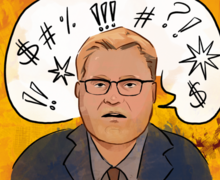Being sidelined helped Sonya Treshcheva connect more with her teammates
Corey Henry | Staff Photographer
Sonya Treshcheva missed part of her freshman season with an ankle injury.
Their Syracuse teammates don’t know it, but Sofya Golubovskaya and Sonya Treshcheva hated each other when they first met.
When they were 11 or 12 years old, Golubovskaya approached a swimming Treshcheva at a tournament in Spain. Golubovskaya was dressed and ready for a doubles match in 30 minutes. Treshcheva remembers Golubovskaya saying something or touching her, and she kicked at Golubovskaya and pulled her into the water.
When they practiced together at the same academy about a year later, they grew closer. Eventually, they became doubles partners, too. They had different personalities, but the same sense of humor — one that Treshcheva can’t describe. She just knows that she laughs more when she’s around Golubovskaya. On the court in doubles, they’re relaxed and they joke between themselves, Treshcheva said.
“I had only Sofya, to be honest,” Treshcheva, a freshman, said of growing up in Russia. “It was really tough there.”
Because of a rigorous training schedule and classes, Golubovskaya, at times, was Treshcheva’s only close friend. When now-sophomore Golubovskaya came to No. 31 Syracuse (13-12, 5-9 Atlantic Coast), she called Treshcheva often, recruiting her to also play for the Orange. Trescheva took multiple exams and an English course to prepare. After months of familiarizing herself, she’s embraced her new friends and environment, while also adjusting to being part of a team and maintaining her close relationship with Golubovskaya.
Before entering Syracuse University, Treshcheva wasn’t used to cheering. Tennis was an individual sport in Moscow: She traveled alone to tournaments around Europe and arranged travel from airports to matches by herself. Often, other members of her tennis club would be there, making it easier to find hitting partners. But they weren’t a team.
“There (in Russia), I played only for myself, my rankings, and I just practiced and worked hard by myself, for myself,” Treshcheva said. “Here, I need to think about my teammates, what the team needs.”
At second doubles for SU, Treshcheva combined with Golubovskaya to reach No. 24 in the Intercollegiate Tennis Association doubles rankings. Golubovskaya helped her at first to adjust to collegiate tennis, but a left ankle injury hampered her progress on the court in early February.

Anna Henderson | Digital Design Editor
When Treshcheva returned from injury, though, her previously assured spot at sixth singles was shared by seniors Masha Tritou and Libi Mesh.
Off the court, Treshcheva’s habits from Russia seeped into her demeanor, and she was hesitant to cheer for her teammates at first. During one game, strength and conditioning coach William Hicks approached Treshcheva on the bleachers at Drumlins Country Club. Hicks hadn’t heard her voice all match while Syracuse’s top doubles pair trailed by a break.
“Say, ‘Wake up ‘Cuse,’” Hicks instructed Treshcheva.
“Sorry,” she mumbled in response.
More sideline time meant cheering became her way of contributing. In a match on Feb. 15, Otto the Orange went around the bleachers offering high-fives. While Mesh accepted the offer, Trescheva ignored it. She was “not yet” friends with Otto, Mesh said.
As Treshcheva became more comfortable, encouragement and laughter replaced silence.
“Being injured … it’s much harder to be on the team and watch everybody else play,” senior Gabriela Knutson said. “But it makes you as a person, and at that point, you make a choice whether to be a good supporter or just give up. And she’s (Treshcheva) taken the high road and really been a great supporter of the team.”
At Syracuse, Treshcheva isn’t reliant on just her Russian compatriot. SU has grown Treshcheva’s circle of friends, and she no longer feels isolated, like in Russia. Many of her teammates say she’s one of the funniest players on the team — just in the way she acts, not always what she says. Tritou pointed immediately to Treshcheva’s Instagram to describe her humor, which has captions like, “Russo turisto” and “2COOL4YOU” on a picture with Golubovskaya and some other friends in Moscow. SU head coach Younes Limam said Treshcheva is shy in public, but hilarious in the locker room.
There are still times when Golubovskaya and Treshcheva will be the only ones laughing, unable to explain why, even to those on the team who speak Russian.
“Dina (Hegab), she’s always laughing with us because she doesn’t understand anything (we’re saying),” Treshcheva said. “But she’s laughing.”
She’s also grown close with some of the Russian volleyball players. Golubovskaya was already friends with a few, but she also befriended two freshmen who joined the team this year. After morning practices at Manley Field House, Treshcheva often grabs breakfast with them before heading to class.
“I’m not alone here,” Treshcheva said. “And it’s kind of cool too, but it’s so much different.”
Published on April 24, 2019 at 10:28 pm
Contact Arabdho: armajumd@syr.edu | @aromajumder






